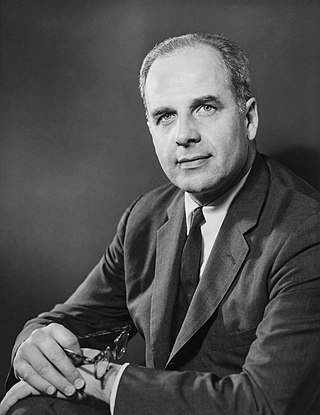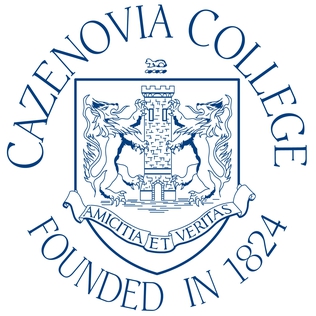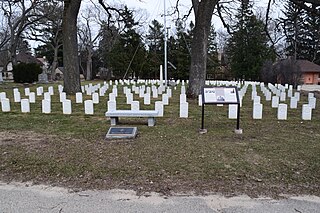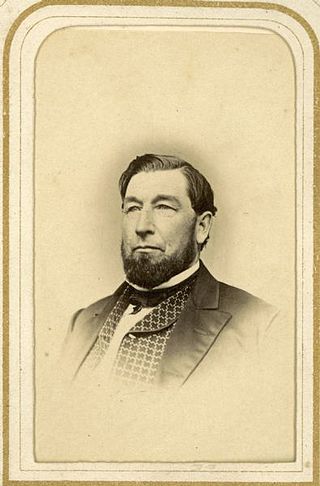Related Research Articles

Beloit is a city in Rock County, Wisconsin, United States. As of the 2020 census, the city had a population of 36,657 people. Beloit is a principal city of the Janesville-Beloit Metropolitan Statistical Area and is included in the Madison Combined Statistical Area.

Gaylord Anton Nelson was an American politician from Wisconsin who served as a United States senator and governor. He was a member of the Democratic Party and the founder of Earth Day, which launched a new wave of environmental activism.

Cazenovia College was a private college in Cazenovia, New York. Founded as the Genesee Seminary in 1824 and sponsored by the Methodist Church, in 1894 the college adopted the name of Cazenovia Seminary. It was reorganized in 1942 after church sponsorship was withdrawn and was Cazenovia College for Women from 1961 to 1982, when the college became co-educational again. It closed on June 30, 2023 due to poor finances and other economic issues.
John Johnson may refer to:

The University of Wisconsin Law School is the law school of the University of Wisconsin–Madison. Located in Madison, Wisconsin, the school was founded in 1868. The University of Wisconsin Law School is guided by a "law in action" philosophy, which emphasizes the role of the law in practice and society. Juris Doctor graduates of the law school enjoy admission to the Wisconsin bar by diploma privilege.

William Albert Steiger was a member of the US House of Representatives from 1967 to his death from a heart attack in Washington, DC, in 1978. He served as a Republican from Wisconsin.

Frederic Thomas Greenhalge was a British-born lawyer and politician in the United States state of Massachusetts. He served in the United States House of Representatives and was the state's 38th governor. He was elected three consecutive times, but died early in his third term. He was the state's first foreign-born governor.
Wisconsin's 2nd congressional district is a congressional district of the United States House of Representatives in southern Wisconsin, covering Dane County, Iowa County, Lafayette County, Sauk County and Green County, as well as portions of Richland County and Rock County. The district includes Madison, the state's capital, its suburbs and some of the surrounding areas. Like many districts anchored by a college town, the district is heavily Democratic, and includes the University of Wisconsin-Madison.
Mount Morris College was a religious college affiliated with the Church of the Brethren in Mount Morris, Illinois, USA. The original institution at this location was Rock River Seminary, which was founded by the Methodist Church in 1839. The Methodists closed Rock River Seminary in 1878 and subsequently sold the seminary grounds and buildings to the Church of the Brethren. The Brethren reorganized the school and reopened it in 1879 as Mount Morris Seminary and Collegiate Institute. It officially became Mount Morris College in 1884.

Forest Hill Cemetery is located in Madison, Wisconsin, and was one of the first U.S. National Cemeteries established in Wisconsin.
The University of Wisconsin–Madison College of Letters and Science is the largest college of the University of Wisconsin–Madison. It is located at Madison, Wisconsin.

Westbrook College was a liberal arts college in Portland, Maine, founded 1831 as Westbrook Seminary in Westbrook, Maine. It closed in 1996 and merged with the University of New England, which uses its old campus.

The 1878–79 United States Senate elections were held on various dates in various states. As these U.S. Senate elections were prior to the ratification of the Seventeenth Amendment in 1913, senators were chosen by state legislatures. Senators were elected over a wide range of time throughout 1878 and 1879, and a seat may have been filled months late or remained vacant due to legislative deadlock. In these elections, terms were up for the senators in Class 3.
George Lombard Frost was an American lawyer from Dodgeville, Wisconsin who served in the Wisconsin Senate as a Democrat and later in the Wisconsin State Assembly as a Greenback.

Philo Dunning was an American merchant and druggist from Madison, Wisconsin who held a number of local office, spent a single one-year term as a Reform Party member of the Wisconsin State Assembly from Dane County, and served on the state fisheries commission.
John T. Lyle Jr. was an American farmer from Montrose, Wisconsin, who served as a member of the Wisconsin State Assembly and as chairman of his town.
Central High School in Madison, Wisconsin was open from 1854 until 1969. The student newspaper was The Madison Mirror and the yearbook was Tychoberahn. The school nickname was the Tigers, the colors black and orange and moved in 1908 to the site where it would stay until it closed.
References
- ↑ Madison, Wisconsin, city directory 1900-1. Containing a complete business, street and general directory, (in the latter, wives' names appear in same line with husbands') Angell's patent numerical directory, and city, county, state and federal officers, churches, schools, secret and benevolent societies, and public buildings; and a directory of the faculty, societies and students of the University of Wisconsin Angell and Hastreiter, 1900-1901; p. 277
- ↑ https://dsps.wi.gov/Documents/EAClosedSchoolsList.pdf LISTING OF CLOSED WISCONSIN POSTSECONDARY INSTITUTIONS Wisconsin Educational Aids Board
- ↑ "(319) Madison Business College".
- ↑ Steiger, Ernst. Steiger's Educational Directory for 1878 New York: E. Steiger, 1878; p. 85]
- ↑ "Editorial" Wisconsin Journal of Education Vol. 14, No. X (October 1884); p. 447
- ↑ Associated Press. "Nobel Peace Prize winner studied at Madison Business College" Wisconsin State Journal October 8, 2011
42°59′43″N89°31′04″W / 42.99528°N 89.51778°W